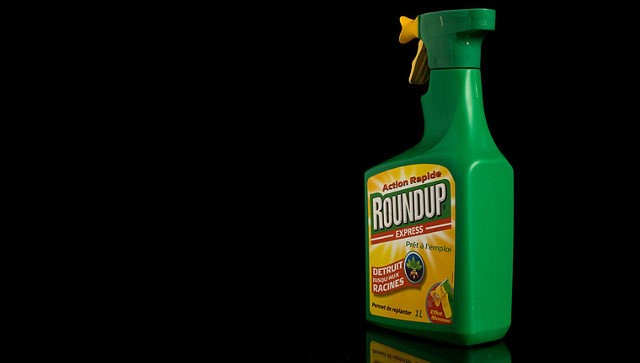Professor Christopher Portier, one of the co-authors of the World Health Organisation’s International Agency for Research on Cancer’s (IARC) recent report which determined Glyphosate’s status as a probable carcinogen, reiterated the IARC’s conclusions, and said: “Glyphosate is definitely genotoxic. There is no doubt in my mind.”

Professor Portier was speaking in London at a scientific briefing on glyphosate in Westminster, London organized by the Soil Association.
For Full Information on Glyphosate and to Test Yourself and Your Family Click Here
The Soil Association is calling for a UK ban on the use of Glyphosate sprayed on UK wheat as a pre-harvest weedkiller and its use to kill the crop to ripen it faster. New figures analysed by the Soil Association from government data were released at a scientific briefing in London on 15 July 2015. This revealed Glyphosate use in UK farming has increased by 400% in the last 20 years and it’s one of the three pesticides regularly found in routine testing of British bread – appearing in up to 30% of samples tested by the Defra committee on Pesticide Residues in Food (PRiF).
Dr Robin Mesnage of the Department of Medical and Molecular Genetics at Kings College in London, revealed new data analysis showing RoundUp is 1,000 times more toxic than Glyphosate alone. “Glyphosate is everywhere throughout our food chain – in our food and water. The lack of data on toxicity of Glyphosate is not proof of safety and these herbicides cannot be considered safe without proper testing. We know Round Up, the commercial name of Glyphosate based herbicides, contains many other chemicals which, when mixed together are 1,000 times more toxic than Glyphosate on its own.”
In response to the IARC conclusions, Claire Robinson, an editor at GMWatch.org said: “Outside the United Kingdom, the reaction to the WHO IARC report has been dramatic. Some retailers in Switzerland and Germany have removed Glyphosate products and France has committed to do so by 2018 and German states are calling for an EU wide ban. The Danish Working Environment Authority has declared it as a carcinogen and El Salvador and Sri Lanka have banned it and the Colombia government has banned aerial spraying on coca crops.”
Three months ago, the World Health Organisation’s International Agency for Research on Cancer (IARC), concluded ‘Glyphosate is probably carcinogenic to humans’. The newly recognised dangers of Glyphosate come against a background of increased use in the UK. Glyphosate is used in public parks and other urban areas to kill weeds, and in the last year for which government figures are available, nearly a third of UK cereals, wheat and barley, were sprayed with Glyphosate – a total of just over one million hectares.
Peter Melchett, Soil Association Policy Director said; “If Glyphosate ends up in bread it’s impossible for people to avoid it, unless they are eating organic. On the other hand, farmers could easily choose not to use Glyphosate as a spray on wheat crops – just before they are harvested. This is why the Soil Association is calling for the immediate ending of the use of Glyphosate sprays on wheat destined for use in bread.”
We heard today that we shouldn’t rely on regulators to protect our health, the battle will be won by consumers ensuring retailers and bread manufacturers insist their products don’t contain any Glyphosate. Although the quantities found are below the official safety level, that limit was agreed before the latest scientific findings about the dangers of Glyphosate. The Glyphosate spraying season starts now, and in the interests of human health and the quality of British bread, the government needs to call a halt to the spraying before it starts.”
A recent European study on city dwellers found that in the UK, 7 out of 10 people had traces of this weedkiller in their urine. The food industry tells us that the levels of Glyphosate in food poses no danger to the British public. But the findings from the World Health Organisation, and the cocktail of chemicals often found in bread, call this into serious question.
The levels of Glyphosate found in bread are well below the Maximum Residue level (MRL) set by the EU. However, the MRL was set well before this latest determination by the WHO. In addition, the MRL for Glyphosate has always been a matter of controversy, because, if Glyphosate is an endocrine disrupter as some scientists suggest, there may be no safe lower level for human consumption. Whatever the MRL, research into public opinion shows that the presence of any chemicals in food is one of the main health concerns for consumers, especially those with children.
Notes
1. The Soil Association has written in recent weeks to the Farming Minister at Defra, George Eustice MP, the President of the National Farmers’ Union, Meurig Raymond, the National Association of British and Irish Flour Millers, all the major supermarkets (ASDA, Co-op, M&S, Morrisons, Sainsbury’s, Tesco and Waitrose) and bread manufacturers (Hovis, Warburtons, Allied Bakery and Brace’s) calling for them to ensure no British wheat destined for bread-making is sprayed with Glyphosate before this year’s harvest, and that none of the bread that they sell contains Glyphosate weed-killer.
2. Professor Portier, Dr Mesnage and Claire Robinson were speaking at a Soil Association scientific briefing in Westminster on 15 July.


















Please watch & share this MUST WATCH lecture by Dr. Thierry Vrain – a retired Canadian expert on genetic engineering – on the toxicity and human health hazards of glyphosate/RoundUp:
www.youtube.com/watch?v=yiU3Ndi6itk